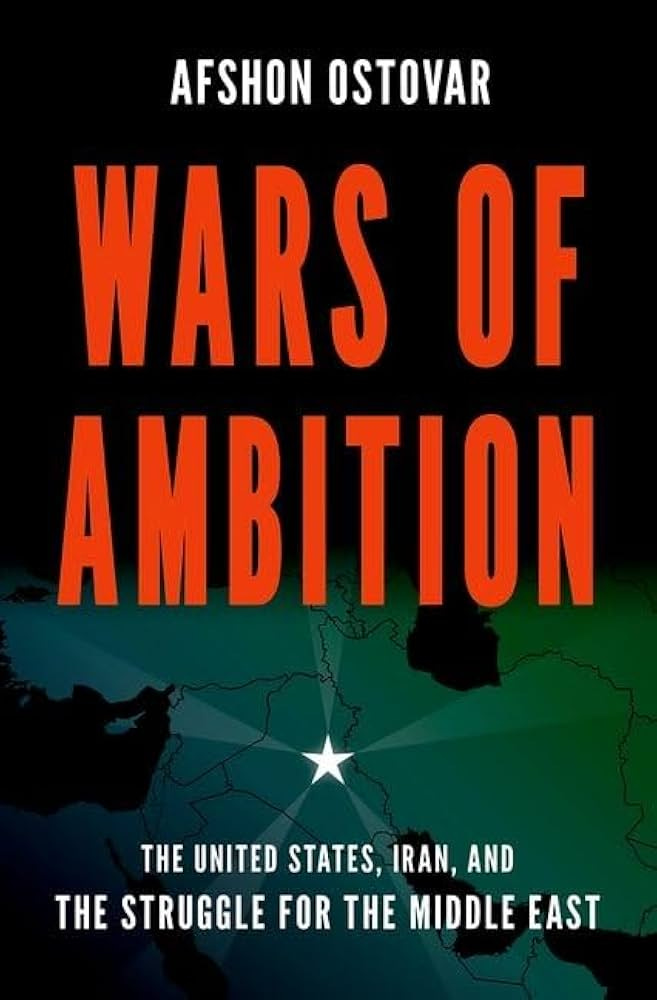Iran's Strategic Rise and Fall and....?
My conversation with Afshon Ostovar about his book Wars of Ambition, plus the early days of the Trump administration
I’m crashing on a couple of major deadlines this week, so this week’s blog post will be short and sweet.
There’s a lot — like, a lot — to talk about with Trump coming back into office, obviously. Only a few of the executive orders so far look to directly impact the Middle East, both in negative ways — the designation of Ansar Allah (the Houthis) as a foreign terrorist organization, which won’t have much effect on the Houthis but will severely complicate the delivery of humanitarian assistance to Yemenis, and the cancelation of sanctions against extreme right wing Israeli settlers, which had been one of the very few positive steps the Biden administration had managed to take towards Israel as it expanded recklessly into the West Bank.
It seems likely that Trump is laying the groundwork to reimpose the “Muslim Ban” which wreaked so much havoc on university students (as well as families and everyone else from the region of course). Administrative moves such as halting NIH grantmaking and the frenzied assault on anything related to “DEI” clearly foreshadow a wider assault on higher education.
Some of the damage will clearly be self-inflicted: Harvard University, which so often sets broader trendlines within elite institutions and has almost unique financial means to resist outside pressure, has pre-emptively capitulated to the new regime by settling two lawsuits alleging institutional antisemitism and adopting the controversial IHRA definition of antisemitism, which essentially conflates criticism of Israel with antisemitism and establishes requirements which could well make it impossible to do serious research, education, or public events on the Middle East.
One of the strangest things Trump did on the Middle East was to remove secret service protection from Mike Pompeo, John Bolton and Brian Hook — all Iran hawks and key members of the team which implemented “Maximum Pressure” on Iran during his first administration. It seems bad leaving these guys exposed to possible danger. Everyone is trying to read the tea leaves as to whether it’s a sign that Trump plans to pivot towards diplomacy with Iran, or if it’s just Trump being vindictive about anyone who he thinks insulted him or didn’t sufficiently support his coup attempt. Hard to know.
One of the least surprising things was Mohammed bin Salman pledging to invest $600 billion in the United States under Trump, and Trump responding by asking for $1 trillion. MBS, as they say, understood the assignment. That’s where the bidding for US foreign policy now starts.
I’m sure there will be more coming very soon, unfortunately, and I plan on writing about as much of it as possible. I’ve been warning for a long time now that Middle East Studies was the leading edge for a broader assault on academia. And now here we are… and it sure doesn’t look like the academy is ready for what’s coming.
For now, though, I just want to invite you to listen to this week’s Middle East Political Science podcast, a conversation with Afshon Ostovar of the Naval Postgraduate School about his book Wars of Ambition: Iran, the United States, and the Struggle for the Middle East (Oxford University Press).
It’s a really timely and fascinating conversation. Ostovar begins by laying out the historical argument of his book about Iran’s regional strategy since 9/11, and especially since the American invasion of Iraq in 2003. As anyone familiar with his prior work would expect, Ostovar has a very fine grained and empirically substantive understanding of Iran’s regional network of allies and proxies. His book shows how Iran engaged with and cultivated these organizations which developed in local context, and how those relationships evolved over time. He places less significance on Qassem Soleimani’s individual role than do most accounts of the IRGC and Iran’s regional profile — something which regional experts will want to engage with.
Ostovar makes a very provocative argument that by the fall of 2023, Iran was at the peak of its influence, had largely won the battle for the Middle East (look at the Chinese brokered Saudi-Iranian rapprochement, for instance), and would have stayed on that path if it had only kept out of the aftermath of October 7 (which he sees little evidence it planned or encouraged Hamas to carry out). Since then, however, he sees nothing but catastrophe for Iran’s carefully designed strategic posture — Hezbollah badly damaged, Asad fallen, the Houthis in Western crosshairs, and Iran unable to harm Israel significantly with its missile barrages. He paints a picture of an Iran which has suffered almost unthinkable strategic setbacks, losing both its deterrent capability against Israel and its ability to impose its will across multiple regional theaters. We talk about whether this is just a setback or whether it’s really a conclusive defeat — I incline towards the former, expecting Iran to be resilient and to find plenty of fertile ground in regional chaos and Israeli overreach; you can listen to his answer for yourself!
Then there’s the rumor that Trump wants to bring Iran into the Abraham Accords. Seems unlikely. Would certainly shake things up, I suppose.
I’ll be back next week with a full MENA Academy roundup and more — thanks for reading and enjoy the podcast!




